- Features for Creative Writers
- Features for Work
- Features for Higher Education
- Features for Teachers
- Features for Non-Native Speakers
- Learn Blog Grammar Guide Community Events FAQ
- Grammar Guide

Sentence Starters: Ultimate List to Improve Your Essays and Writing

Ashley Shaw
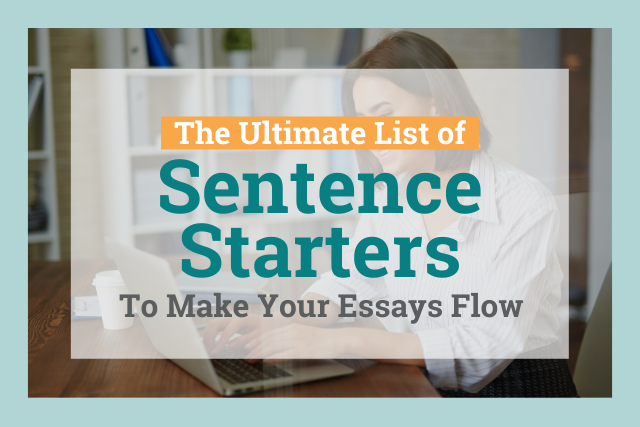
This blog post is going to be about … No. Too boring.
Today, I am going to talk to you about ... No. Too specific.
This is a blog post for all writers ... Nope. Too generic.
Has this ever been you while writing? I get it. Writing a good sentence can be hard, and when you have to string a whole lot of them together, the task can become daunting. So what do you do?
From the first sentence you write to the very last, you want each one to show your style and motivate your reader to keep reading. In this post, we are going to think about how you start your sentences.
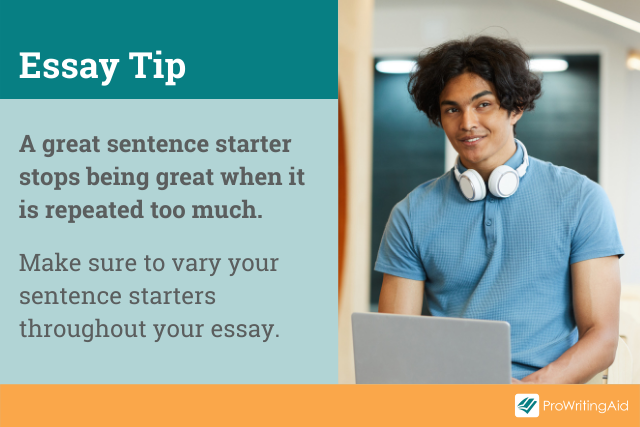
What Is a Good Sentence Starter for an Essay Introduction?
What is a good sentence starter for a body paragraph, 25 useful transitions, can i repeat a sentence starter, how can i rephrase "in conclusion".
The first paragraph of a paper can make or break your grade. It is what gets your audience into the topic and sets the whole stage. Because of this, it is important to get your readers hooked early.
The first sentence of a paper is often called the hook. It shouldn’t be anything ordinary. It should have strong language and be a little surprising, with an interesting fact, story, statistic, or quote on the topic.
Because it is designed to pull the reader in and surprise them a little, it is often good to avoid pre-written sentence starter examples when writing your hook. Just get into it here, and worry about the flow later.
Here are some examples:
Spider webs were once used as bandages.
I taught myself to read when I was three. At least, that’s the story my parents tell.
Recent studies suggest that the average person lies at least once in every conversation.
“The world is bleeding and humans wield the knife,” or so says environmental scientist So Andso.
(P.S. Except for example 1, which is true, I just made all of these up to demonstrate my point. So, please don’t quote me on these!)
Once you jump right in with your hook, it is time to start working on ways to move sentences along. Here is where you may need some sentence starter examples.
In your first paragraph, you basically want to connect your hook to your thesis. You’ll do this with a few sentences setting up the stage for your topic and the claim you will make about it. To do that, follow the tips found in the next section on body paragraphs and general sentence starter tips.
Many of the tips I am about to discuss can be used anywhere in a paper, but they are especially helpful when writing body paragraphs.
Let’s start with one of the most important types of sentence starter in essay writing: transition words.
How Do I Use Transitions in an Essay?
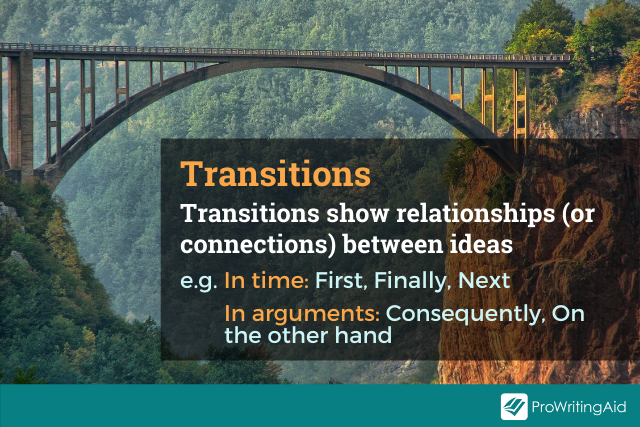
If you want to start writing terrific sentences (and improve your essay structure ), the first thing you should do is start using transition words.
Transition words are those words or phrases that help connect thoughts and ideas. They move one sentence or paragraph into another, and they make things feel less abrupt.
The good thing about transition words is that you probably know a lot of them already and currently use them in your speech. Now, you just need to transition them into your writing. (See what I did there?)
Before we get into examples of what a good transition word is, let’s look at a paragraph without any transitions:
I went to the store. I bought bacon and eggs. I saw someone I knew. I said hello. I went to the cashier. They checked me out. I paid. I got my groceries. I went to my car. I returned home.
Yikes! That is some boring writing. It was painful to write, and I am sure it is even worse to read. There are two reasons for this:
- I start every sentence with the same word (more on this later)
- There are no signposts showing me how the ideas in the paragraph connect.
In an essay, you need to show how each of your ideas relate to each other to build your argument. If you just make a series of statements one after the other, you’re not showing your instructor that you actually understand those statements, or your topic.
How do we fix this? Transition words. Roughly 25% of your sentences should start with a transition word. If you can hit that number in your essay, you’ll know that you’ve made meaningful steps towards demonstrating your understanding.
Of course, hitting that number isn’t enough—those transitions need to be meaningful. Let’s look at the different types of transitions and how you can use them.
What Are Words Like First , Next , and Last Called?
You probably already use some transitions in your essays. For example, if you start a paragraph with firstly , you’ve used a transition word. But transitions can do so much more!
Here are 25 common transitional words and phrases that you could use in your essay:
- Additionally / In Addition
- Alternatively / Conversely
- As a result of
- At this time
- Consequently
- Contrary to
- First(ly), Second(ly), etc.
- In contrast
- Nonetheless
- On the other hand
- Particularly / In particular
- In other words
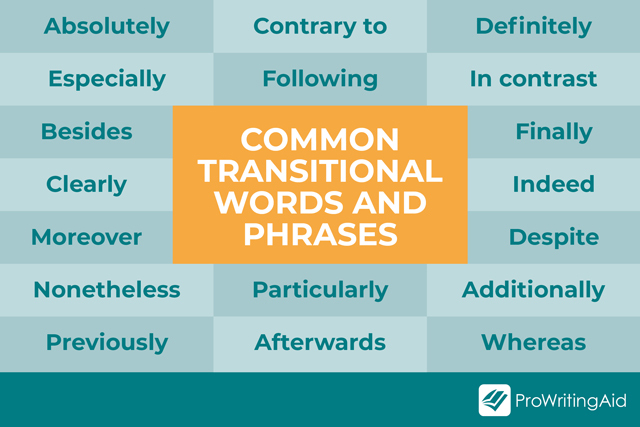
This list isn’t exhaustive, but it is a good start.
These words show different types of relationships between ideas. These relationships fall into four main categories: Emphasis , Contrast , Addition , and Order .
What Are Emphasis Transition Words?
These phrases are used when you want to highlight a point. Examples from my above list include clearly , particularly , and indeed . Want to see some more? Follow my bolded transitions: Undoubtedly , you understand now. It should be noted that you don’t need to worry.
How Do You Use Addition Transitions?
These words add on to what you just said. These are words like along with , moreover , and also . Here are some more: Not only are you going to be great at transitions after this, but you will also be good at writing sentences. Furthermore , everyone is excited to see what you have to say.
How Can I Use Transitions to Contrast Ideas?
This is the opposite of addition, and you use it when you want to show an alternative view or to compare things. Examples from my list include words like nonetheless , contrary to , and besides .
Here are some more: Unlike people who haven’t read this article, you are going to be really prepared to write great sentences. Even so , there is still a lot more about writing to learn.
How Do I Order Ideas in My Essay?
A good first step is using order transition words.
This set of transitions helps mark the passage of time or gives an order to events. From the list, think of things like first and finally . Now for some extras: At this time yesterday , you were worried about starting sentences. Following this , though, you will be an expert.
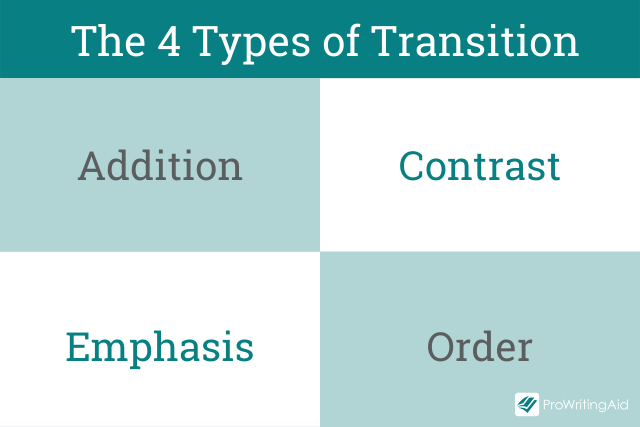
Now that you get the concept of transitions, let’s go back to that poorly written paragraph above and add some in to see what happens:
This morning , I went to the store. While I was there, I bought bacon and eggs. Then I saw someone I knew. So I said hello. After that , I went to the cashier. At that time , they checked me out. First , I paid. Next , I got my groceries. Following that , I went to my car. Finally , I returned home.
(Notice the use of commas after most of these transitions!)
This isn’t the best paragraph I’ve ever written. It still needs a lot of work. However, notice what a difference just adding transitions makes. This is something simple but effective you can start doing to make your sentences better today.
If you want to check your transition usage, try ProWritingAid’s Transitions report . You’ll see how many of each type of transition word you've used so you can pin-point where you might be losing your reader.
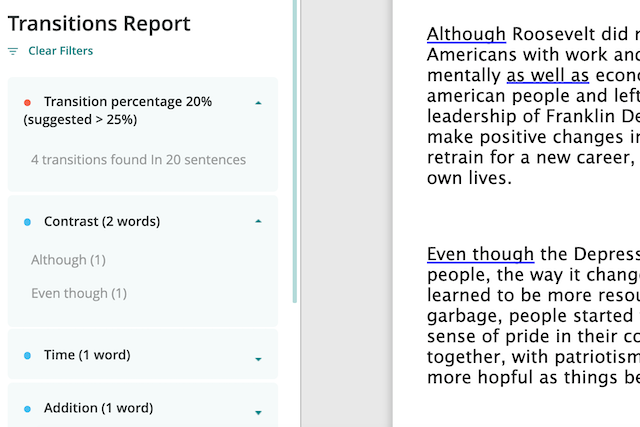
Sign up for a free ProWritingAid account to try it out.
What Are Some Linking Phrases I Can Use in My Essay?
As well as individual words, you can also use short phrases at the beginning of your sentences to transition between ideas. I just did it there— "As well as individual words" shows you how this section of the article is related to the last.
Here are some more phrases like this:
As shown in the example,
As a result of this,
After the meeting,
While this may be true,
Though researchers suggest X,
Before the war began,
Until we answer this question,
Since we cannot assume this to be true,
While some may claim Y,
Because we know that Z is true,
These short phrases are called dependent clauses . See how they all end with a comma? That's because they need you to add more information to make them into complete sentences.
- While some may claim that chocolate is bad for you, data from a recent study suggests that it may have untapped health benefits .
- Since we cannot assume that test conditions were consistent, it is impossible to reach a solid conclusion via this experiment .
- As a result of this, critics disagree as to the symbolism of the yellow car in The Great Gatsby .
The bolded text in each example could stand on its own as a complete sentence. However, if we take away the first part of each sentence, we lose our connection to the other ideas in the essay.
These phrases are called dependent clauses : they depend on you adding another statement to the sentence to complete them. When you use a sentence starter phrase like the ones above in your writing, you signal that the new idea you have introduced completes (or disrupts) the idea before it.
Note: While some very short dependent clauses don’t need a comma, most do. Since it is not wrong to use one on even short ones (depending on the style guide being used), it is a good idea to include one every time.
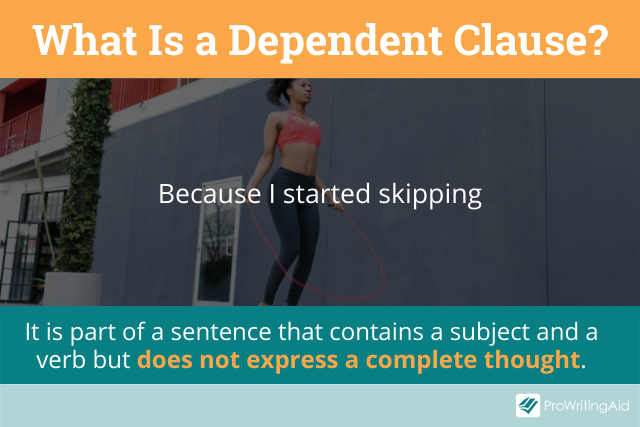
Along with missing transitions and repeating sentence structure, another thing that stops sentences from being great is too much repetition. Keep your sentences sharp and poignant by mixing up word choices to start your sentences.
You might start your sentence with a great word, but then you use that same word 17 sentences in a row. After the first couple, your sentences don’t sound as great. So, whether it is varying the transitional phrases you use or just mixing up the sentence openers in general, putting in some variety will only improve your sentences.
ProWritingAid lets you know if you’ve used the same word repeatedly at the start of your sentences so you can change it.
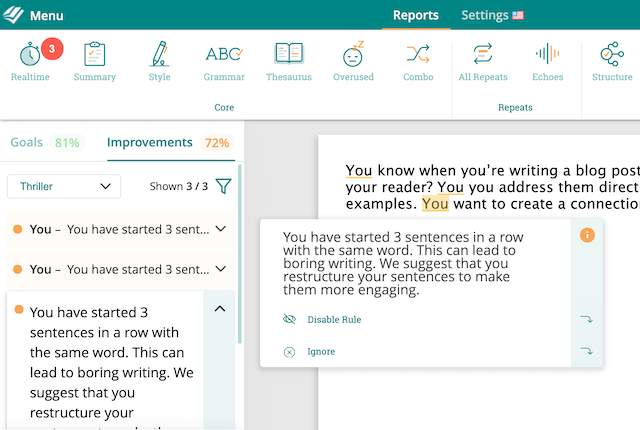
The Repeats Report also shows you all of the repeats in your document. If you've used a sentence starter and then repeated it a couple of paragraphs down, the report will highlight it for you.
Try the Repeats Report with a free ProWritingAid account.
Now that you have your introduction sentences and body sentences taken care of, let’s talk a little about conclusion sentences. While you will still use transitions and clauses as in the body, there are some special considerations here.
Your conclusion is what people will remember most after they finish reading your paper. So, you want to make it stand out. Don’t just repeat yourself; tell them what they should do with what you just told them!
Use the tips from above, but also remember the following:
Be unique. Not only should you vary the words you use to start different sentences, but you should also think outside of the box. If you use the same conclusion sentence starter everyone else is using, your ideas will blend in too.
Be natural. Some of the best writing out there is writing that sounds natural. This goes for academic writing, too. While you won’t use phrases like "at the end of the day" in essay writing, stilted phrases like "in conclusion" can disrupt the flow you’ve created earlier on.
Here are some alternatives to "in conclusion" you could use in an essay:
- To review, ... (best for scientific papers where you need to restate your key points before making your final statement)
- As has been shown, ...
- In the final analysis, ...
- Taking everything into account, ...
- On the whole, ...
- Generally speaking, ...
If you’re looking for more ways to rephrase "in conclusion," take a look at our complete list of synonyms you can use.
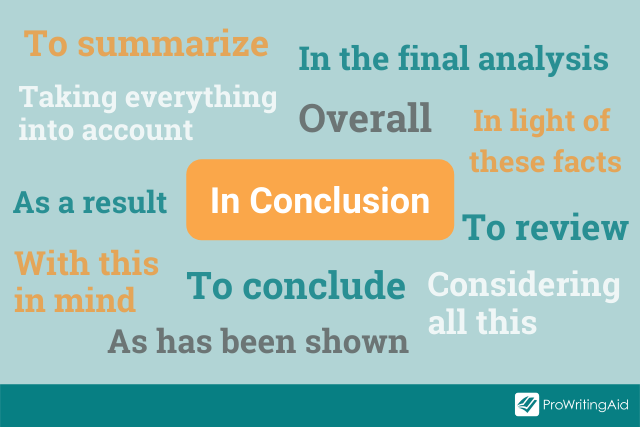
There may not be a set word or words that you can use to make your sentences perfect. However, when you start using these tips, you’ll start to see noticeable improvement in your writing.
If you’ve ever heard people talk about pacing and flow in academic writing, and you have no idea what they mean or how to improve yours, then this is your answer. These tips will help your writing sound more natural, which is how you help your ideas flow.
Take your writing to the next level:

20 Editing Tips from Professional Writers
Whether you are writing a novel, essay, article, or email, good writing is an essential part of communicating your ideas., this guide contains the 20 most important writing tips and techniques from a wide range of professional writers..

Be confident about grammar
Check every email, essay, or story for grammar mistakes. Fix them before you press send.
Ashley Shaw is a former editor and marketer/current PhD student and teacher. When she isn't studying con artists for her dissertation, she's thinking of new ways to help college students better understand and love the writing process.
Get started with ProWritingAid
Drop us a line or let's stay in touch via :
How to Begin an Essay: 13 Engaging Strategies
ThoughtCo / Hugo Lin
- Ph.D., Rhetoric and English, University of Georgia
- M.A., Modern English and American Literature, University of Leicester
- B.A., English, State University of New York
An effective introductory paragraph both informs and motivates. It lets readers know what your essay is about and it encourages them to keep reading.
There are countless ways to begin an essay effectively. As a start, here are 13 introductory strategies accompanied by examples from a wide range of professional writers.
State Your Thesis Briefly and Directly
But avoid making your thesis a bald announcement, such as "This essay is about...".
"It is time, at last, to speak the truth about Thanksgiving, and the truth is this. Thanksgiving is really not such a terrific holiday...." (Michael J. Arlen, "Ode to Thanksgiving." The Camera Age: Essays on Television . Penguin, 1982)
Pose a Question Related to Your Subject
Follow up the question with an answer, or an invitation for your readers to answer the question.
"What is the charm of necklaces? Why would anyone put something extra around their neck and then invest it with special significance? A necklace doesn't afford warmth in cold weather, like a scarf, or protection in combat, like chain mail; it only decorates. We might say, it borrows meaning from what it surrounds and sets off, the head with its supremely important material contents, and the face, that register of the soul. When photographers discuss the way in which a photograph reduces the reality it represents, they mention not only the passage from three dimensions to two, but also the selection of a point de vue that favors the top of the body rather than the bottom, and the front rather than the back. The face is the jewel in the crown of the body, and so we give it a setting." (Emily R. Grosholz, "On Necklaces." Prairie Schooner , Summer 2007)
State an Interesting Fact About Your Subject
" The peregrine falcon was brought back from the brink of extinction by a ban on DDT, but also by a peregrine falcon mating hat invented by an ornithologist at Cornell University. If you cannot buy this, Google it. Female falcons had grown dangerously scarce. A few wistful males nevertheless maintained a sort of sexual loitering ground. The hat was imagined, constructed, and then forthrightly worn by the ornithologist as he patrolled this loitering ground, singing, Chee-up! Chee-up! and bowing like an overpolite Japanese Buddhist trying to tell somebody goodbye...." (David James Duncan, "Cherish This Ecstasy." The Sun , July 2008)
Present Your Thesis as a Recent Discovery or Revelation
"I've finally figured out the difference between neat people and sloppy people. The distinction is, as always, moral. Neat people are lazier and meaner than sloppy people." (Suzanne Britt Jordan, "Neat People vs. Sloppy People." Show and Tell . Morning Owl Press, 1983)
Briefly Describe the Primary Setting of Your Essay
"It was in Burma, a sodden morning of the rains. A sickly light, like yellow tinfoil, was slanting over the high walls into the jail yard. We were waiting outside the condemned cells, a row of sheds fronted with double bars, like small animal cages. Each cell measured about ten feet by ten and was quite bare within except for a plank bed and a pot of drinking water. In some of them brown silent men were squatting at the inner bars, with their blankets draped round them. These were the condemned men, due to be hanged within the next week or two." (George Orwell, "A Hanging," 1931)
Recount an Incident That Dramatizes Your Subject
"One October afternoon three years ago while I was visiting my parents, my mother made a request I dreaded and longed to fulfill. She had just poured me a cup of Earl Grey from her Japanese iron teapot, shaped like a little pumpkin; outside, two cardinals splashed in the birdbath in the weak Connecticut sunlight. Her white hair was gathered at the nape of her neck, and her voice was low. “Please help me get Jeff’s pacemaker turned off,” she said, using my father’s first name. I nodded, and my heart knocked." (Katy Butler, "What Broke My Father's Heart." The New York Times Magazine , June 18, 2010)
Use the Narrative Strategy of Delay
The narrative strategy of delay allows you to put off identifying your subject just long enough to pique your readers' interest without frustrating them.
"They woof. Though I have photographed them before, I have never heard them speak, for they are mostly silent birds. Lacking a syrinx, the avian equivalent of the human larynx, they are incapable of song. According to field guides the only sounds they make are grunts and hisses, though the Hawk Conservancy in the United Kingdom reports that adults may utter a croaking coo and that young black vultures, when annoyed, emit a kind of immature snarl...." (Lee Zacharias, "Buzzards." Southern Humanities Review , 2007)
Use the Historical Present Tense
An effective method of beginning an essay is to use historical present tense to relate an incident from the past as if it were happening now.
"Ben and I are sitting side by side in the very back of his mother’s station wagon. We face glowing white headlights of cars following us, our sneakers pressed against the back hatch door. This is our joy—his and mine—to sit turned away from our moms and dads in this place that feels like a secret, as though they are not even in the car with us. They have just taken us out to dinner, and now we are driving home. Years from this evening, I won’t actually be sure that this boy sitting beside me is named Ben. But that doesn’t matter tonight. What I know for certain right now is that I love him, and I need to tell him this fact before we return to our separate houses, next door to each other. We are both five." (Ryan Van Meter, "First." The Gettysburg Review , Winter 2008)
Briefly Describe a Process That Leads Into Your Subject
"I like to take my time when I pronounce someone dead. The bare-minimum requirement is one minute with a stethoscope pressed to someone’s chest, listening for a sound that is not there; with my fingers bearing down on the side of someone’s neck, feeling for an absent pulse; with a flashlight beamed into someone’s fixed and dilated pupils, waiting for the constriction that will not come. If I’m in a hurry, I can do all of these in sixty seconds, but when I have the time, I like to take a minute with each task." (Jane Churchon, "The Dead Book." The Sun , February 2009)
Reveal a Secret or Make a Candid Observation
"I spy on my patients. Ought not a doctor to observe his patients by any means and from any stance, that he might the more fully assemble evidence? So I stand in doorways of hospital rooms and gaze. Oh, it is not all that furtive an act. Those in bed need only look up to discover me. But they never do." ( Richard Selzer , "The Discus Thrower." Confessions of a Knife . Simon & Schuster, 1979)
Open with a Riddle, Joke, or Humorous Quotation
You can use a riddle , joke, or humorous quotation to reveal something about your subject.
" Q: What did Eve say to Adam on being expelled from the Garden of Eden? A: 'I think we're in a time of transition.' The irony of this joke is not lost as we begin a new century and anxieties about social change seem rife. The implication of this message, covering the first of many periods of transition, is that change is normal; there is, in fact, no era or society in which change is not a permanent feature of the social landscape...." (Betty G. Farrell, Family: The Making of an Idea, an Institution, and a Controversy in American Culture . Westview Press, 1999)
Offer a Contrast Between Past and Present
"As a child, I was made to look out the window of a moving car and appreciate the beautiful scenery, with the result that now I don't care much for nature. I prefer parks, ones with radios going chuckawaka chuckawaka and the delicious whiff of bratwurst and cigarette smoke." (Garrison Keillor, "Walking Down The Canyon." Time , July 31, 2000)
Offer a Contrast Between Image and Reality
A compelling essay can begin with a contrast between a common misconception and the opposing truth.
"They aren’t what most people think they are. Human eyes, touted as ethereal objects by poets and novelists throughout history, are nothing more than white spheres, somewhat larger than your average marble, covered by a leather-like tissue known as sclera and filled with nature’s facsimile of Jell-O. Your beloved’s eyes may pierce your heart, but in all likelihood they closely resemble the eyes of every other person on the planet. At least I hope they do, for otherwise he or she suffers from severe myopia (near-sightedness), hyperopia (far-sightedness), or worse...." (John Gamel, "The Elegant Eye." Alaska Quarterly Review , 2009)
- 'Whack at Your Reader at Once': Eight Great Opening Lines
- What Is a Compelling Introduction?
- How to Structure an Essay
- Hookers vs. Chasers: How Not to Begin an Essay
- Development in Composition: Building an Essay
- Examples of Great Introductory Paragraphs
- How To Write an Essay
- How to Write a Good Thesis Statement
- How to Write a Great Essay for the TOEFL or TOEIC
- Write an Attention-Grabbing Opening Sentence for an Essay
- How to Develop and Organize a Classification Essay
- 6 Steps to Writing the Perfect Personal Essay
- A Guide to Using Quotations in Essays
- What Is Expository Writing?
- The Introductory Paragraph: Start Your Paper Off Right
Scale your content creation with Strategically AI | Talk to us

Crafting Compelling Sentence Starters for Essays
Embarking on the journey of essay writing can often feel like standing at the edge of a cliff, especially when it comes to crafting that perfect opening line. The initial words of your essay set the tone and can either captivate your reader or lose their interest. In this article, we'll explore various strategies and examples of sentence starters that can elevate your essays, making them not just informative but also engaging and thought-provoking.

The Art of the Opening Sentence
The opening sentence is your first impression, your chance to grab the reader's attention. It's the gateway to your thoughts and arguments, setting the stage for what's to come.
Why Are Good Sentence Starters Important?
- Engagement: A compelling starter draws the reader in, piquing their curiosity.
- Direction: It sets the tone and direction of your essay.
- Context: A well-crafted opening provides a glimpse into the essay's context.
Examples of Effective Sentence Starters
- "In the realm of X, it is often debated that..."
- "Imagine a world where X is the norm..."
- "X is a phenomenon that has captured the attention of many..."
Types of Sentence Starters
Depending on your essay's tone and subject, different types of sentence starters can be employed.
Question Starters
- "Have you ever wondered what it would be like to X?"
- "Why is X considered essential in the field of Y?"
Statement Starters
- "The concept of X has evolved significantly over the years."
- "X is a testament to the power of Y."
Quotation Starters
- "As X once said, '...'"
- "The words of X resonate deeply in the context of Y."
Tailoring Starters to Your Essay
The key to choosing the right starter is understanding the purpose and tone of your essay. Is it argumentative, descriptive, or narrative? Each type demands a different approach to engaging your reader.
Tips for Crafting Your Own Starters
- Know Your Audience: Tailor your language to resonate with your readers.
- Be Concise: Keep it clear and to the point.
- Be Original: Avoid clichés to make your essay stand out.
Summary and Key Insights
Mastering the art of the opening sentence can transform your essays from mundane to memorable. It's about making a connection with your reader and setting the stage for your ideas.
Frequently Asked Questions
What makes a sentence starter too cliché.
A cliché starter is one that's overused and predictable, lacking originality and failing to engage the reader.
Can I start an essay with a quote?
Absolutely! A relevant and thought-provoking quote can be an excellent way to start an essay.
How long should a sentence starter be?
It should be concise enough to be impactful but long enough to set the context.
Is it okay to start an essay with a question?
Yes, starting with a question can be a great way to engage the reader's curiosity.
Can humor be used in essay sentence starters?
If appropriate for the topic and audience, humor can be an effective tool.
The right sentence starter can be the difference between an essay that resonates and one that falls flat. It's your first step in a dialogue with your reader, so make it count.
Looking for more than just tips? Our expert content writing agency offers professional writing services, SEO content, and unlimited revisions to ensure your essays and content not only start strong but also leave a lasting impression.
Scale your content creation with Strategically
Like this article spread the word, related articles.

Finity has a collection of latest 2,500 jobs to join next companies.
- For Talents
- For Companies
- Facebook Group
- Meet the Team
© Finity 2019, All Rights Reserved
Built with love by Grayic
Get Talking with These Sentence Starters: The Ultimate Guide
Sentence starters are an essential tool for anyone who wants to improve their writing skills. They are words or phrases that help to introduce the rest of the sentence, typically set apart by commas. The words that start a sentence are some of the most important in writing: They introduce what the sentence is about so the reader knows what to expect.
In this article, we will explore the benefits of using sentence starters in your writing. We will provide you with examples of sentence starters that you can use in your own writing, and we will explain how to use them effectively. Whether you are a student looking to improve your essay writing skills, or a professional looking to enhance your communication skills, this article will provide you with the tools you need to succeed.

Sentence Starters
What are sentence starters.
As the name would suggest, sentence starters are any words or phrases that can be used to perfectly start a sentence. Every sentence is different, so every sentence requires a different starter to really convey a meaning. A common sentence starter like “however” has a very specific purpose. You wouldn’t just be able to throw the word “however” into the first sentence of an essay, for example, because it wouldn’t be compared against anything.
However, it is a good idea to figure out when is the best time to use certain sentence starters to really add something extra to your writing. It will be what separates you from the rest of the crowd when you get a better understanding of how it should all work.
The Importance of Variety in Sentence Starters
When it comes to writing, sentence starters play a crucial role in grabbing the reader’s attention and conveying the message effectively. However, using the same sentence starters repeatedly can make the writing monotonous and dull, leading to a loss of interest from the reader. This is where the importance of variety in sentence starters comes into play.
Using a mixture of different sentence starters can keep the reader engaged and interested in the content. It also adds emphasis to important points in the text and makes the writing more lively and enjoyable to read.
Additionally, using a variety of sentence starters can help the writer to convey different emotions and tones in their writing. For example, using a rhetorical question as a sentence starter can create a sense of curiosity and make the reader think deeply about the topic. On the other hand, using a declarative sentence as a starter can convey a sense of confidence and authority.
To achieve variety in sentence starters, writers can use a combination of techniques such as varying the length and structure of sentences, using different types of phrases, and incorporating transitional words. By doing so, the writing becomes more dynamic and engaging, making the reader want to keep reading.
Types of Sentence Starters
When it comes to writing, it’s important to have a variety of sentence starters in your arsenal. Different types of sentence starters can help you achieve different effects in your writing. In this section, we’ll cover three types of sentence starters: conjunction starters, adverb starters, and prepositional phrase starters.
Conjunction Starters
Conjunction starters are words that are used to connect two ideas or thoughts. They can be used to show contrast, addition, or cause and effect. Some common conjunction starters include:
Adverb Starters
Adverb starters are words that modify the verb in a sentence. They can be used to describe how, when, where, or to what extent something is happening. Some common adverb starters include:
- Nevertheless
- Furthermore
- Additionally
Here are some examples of adverb starters in use:
- “However, he didn’t let that stop him from pursuing his dreams.”
- “Nevertheless, she persisted in her efforts to make a change.”
- “Furthermore, the study found that the results were consistent across all age groups.”
- “Therefore, it is important to take precautions to prevent the spread of the virus.”
- “Additionally, the report showed that there was a significant increase in sales.”
Prepositional Phrase Starters
Prepositional phrase starters are words that are used to describe the relationship between two things in a sentence. They can be used to show location, time, or direction. Some common prepositional phrase starters include:
Here are some examples of prepositional phrase starters in use:
- “In the morning, she always enjoyed a cup of coffee.”
- “On the way to work, he listened to his favorite podcast .”
- “At the party, she met some new friends.”
- “With a little practice, he became an expert at playing the guitar.”
- “By the end of the day, she was exhausted from all the work.”
Examples of Sentence Starters
When it comes to writing, sentence starters can be incredibly useful. They can help writers get their thoughts flowing, organize their ideas, and make their writing more engaging. In this section, we’ll take a look at some examples of sentence starters that can be used for different types of writing.
For Storytelling
When telling a story, it’s important to hook your readers from the very beginning. Here are some sentence starters that can be used to do just that:
- Once upon a time…
- It all started when…
- In a far-off land…
- Long ago and far away…
- Deep in the heart of…
These sentence starters can be used to set the scene and draw the reader in. Once you’ve hooked your reader, you can use the following sentence starters to move the story along:
- Suddenly…
- Just then…
- Meanwhile…
- Later that day…
- The next morning…
When writing an essay, it’s important to clearly state your argument and support it with evidence. Here are some sentence starters that can help you do just that:
- According to…
- In contrast…
- Similarly…
- On the other hand …
- For example …
These sentence starters can be used to introduce evidence and support your argument. Additionally, you can use the following sentence starters to transition between paragraphs:
- Moving on to…
- In conclusion …
- Taking a closer look…
- Another important point…
- It’s worth noting that…
For Business Writing
When writing for business, it’s important to be clear and concise. Here are some sentence starters that can help you achieve that:
- As previously mentioned…
- To summarize…
- In other words…
- To put it simply…
- The bottom line is…
These sentence starters can be used to summarize information and make your writing more concise. Additionally, you can use the following sentence starters to make requests or give instructions:
- I would appreciate it if…
- Please be advised that…
- Kindly note that…
- In order to…
- It is imperative that…
By using these sentence starters, you can make your business writing more effective and efficient.
Common Mistakes to Avoid
When it comes to using sentence starters, there are some common mistakes that writers should avoid. Here are a few to keep in mind:
Overusing the Same Sentence Starter
One of the most common mistakes writers make is overusing the same sentence starter throughout their writing. While sentence starters can be helpful in guiding the reader through your writing, using the same one repeatedly can make your writing sound repetitive and monotonous. To avoid this, try using a variety of sentence starters throughout your writing.
Using Sentence Starters Incorrectly
Another mistake writers make is using sentence starters incorrectly. For example, beginning a sentence with “and” or “but” can be effective in some cases, but it’s important to use these words appropriately. Additionally, some sentence starters may not be appropriate for certain writing styles or contexts. Make sure to consider the tone and purpose of your writing before using a particular sentence starter.
Failing to Vary Sentence Structure
Using sentence starters can be a great way to vary sentence structure and keep your writing engaging. However, it’s important to also vary the structure of your sentences themselves. Using the same sentence structure repeatedly can make your writing sound dull and uninteresting. Try experimenting with different sentence structures to keep your writing fresh and engaging.
Neglecting Punctuation
Finally, it’s important to remember that sentence starters are just one aspect of good writing. Neglecting punctuation can make your writing difficult to understand and detract from its overall effectiveness. Make sure to use punctuation correctly and consistently throughout your writing.
By keeping these common mistakes in mind, writers can use sentence starters effectively to improve the flow and readability of their writing.
In conclusion, sentence starters are an essential tool that writers use to make their work more organized, coherent, and easy to read. They help to create a smooth flow of ideas and thoughts, making it easier for the reader to follow the writer’s argument or story.
Good sentence starters can be used in different types of writing, including essays, articles, research papers, and even fiction. They help to introduce new ideas, provide evidence, summarize key points, and make transitions between paragraphs and sections.
The use of sentence starters can also help to improve the quality of writing by making it more engaging and captivating. They can be used to create suspense, add emphasis, and convey emotions. Additionally, sentence starters can help to make writing more concise and clear, avoiding ambiguity and confusion.
Overall, using sentence starters is an effective way to improve the quality of writing and make it more organized, coherent, and engaging. Whether you are a student, a professional writer, or someone who enjoys writing for fun, incorporating sentence starters into your work can help you achieve your writing goals and captivate your audience.
Frequently Asked Questions
What are some effective ways to start a sentence?
There are many effective ways to start a sentence, but it all depends on the context and purpose of your writing. Some common ways to start a sentence include using transitional words and phrases, such as “however,” “in addition,” or “meanwhile,” or starting with a strong subject or action verb. You can also use rhetorical questions, quotes, or interesting facts to grab the reader’s attention and set the tone for your writing.
How can sentence starters be used in persuasive writing?
Sentence starters can be very useful in persuasive writing because they can help you introduce your argument and provide evidence to support it. Some effective sentence starters for persuasive writing include “it is clear that,” “research shows that,” or “experts agree that.” These types of sentence starters can help you establish credibility and persuade your reader to agree with your point of view.
What are some common transition sentence starters?
Common transition sentence starters include “however,” “in addition,” “meanwhile,” “therefore,” and “consequently.” These words and phrases can help you connect ideas and create a smooth flow between sentences and paragraphs.
What are some sentence starters for creative writing?
Creative writing often requires more varied and imaginative sentence starters to create a unique and engaging story. Some examples of sentence starters for creative writing include “once upon a time,” “suddenly,” “in a far-off land,” or “the world was never the same again.” These types of sentence starters can help you set the scene, create suspense, or introduce a new character or plot twist.
How can sentence starters be used in speaking?
Sentence starters can be very useful in speaking because they can help you organize your thoughts and communicate your ideas more effectively. Some effective sentence starters for speaking include “I believe that,” “in my opinion,” or “from my experience.” These types of sentence starters can help you express your ideas clearly and confidently.
What are some sentence starters for providing evidence?
When providing evidence to support your argument, it’s important to use sentence starters that clearly indicate the source and relevance of your evidence. Some effective sentence starters for providing evidence include “according to,” “as demonstrated by,” or “for example.” These types of sentence starters can help you present your evidence in a clear and convincing way.
Last Updated on August 9, 2023

Leave a Comment Cancel reply

IMAGES
VIDEO
COMMENTS
Below, we will explain when sentence starters for essays are used and what types of them exist. We will then give you plenty of examples of sentence-starter words and phrases that you can use in your writing. Note: To learn more about word choice in academic writing, you can read our guide: Words to Use in an Essay. Why you need good sentence ...
If you want to start writing terrific sentences (and improve your essay structure ), the first thing you should do is start using transition words. Transition words are those words or phrases that help connect thoughts and ideas. They move one sentence or paragraph into another, and they make things feel less abrupt.
Step 1: Hook your reader. Step 2: Give background information. Step 3: Present your thesis statement. Step 4: Map your essay’s structure. Step 5: Check and revise. More examples of essay introductions. Other interesting articles. Frequently asked questions about the essay introduction.
Use the Historical Present Tense. An effective method of beginning an essay is to use historical present tense to relate an incident from the past as if it were happening now. "Ben and I are sitting side by side in the very back of his mother’s station wagon.
Tailoring Starters to Your Essay. The key to choosing the right starter is understanding the purpose and tone of your essay. Is it argumentative, descriptive, or narrative? Each type demands a different approach to engaging your reader. Tips for Crafting Your Own Starters. Know Your Audience: Tailor your language to resonate with your readers.
October 18, 2022. Blogs, Essay Writing Guideline. A starter sentence is the first few sentences of your essay that lays out your sentence structure, indicates what your essay will focus on, and indicates what type of essay you are writing. Start with a sensational sentence that is related to the topic. This will pique the reader’s attention.
Good example. I wiped the sweat from my head and tried to catch my breath. I was nearly there—just one more back tuck and a strong dismount and I’d have nailed a perfect routine. Some students choose to write more broadly about themselves and use some sort of object or metaphor as the focus.
Sentence starters can be very useful in persuasive writing because they can help you introduce your argument and provide evidence to support it. Some effective sentence starters for persuasive writing include “it is clear that,” “research shows that,” or “experts agree that.”. These types of sentence starters can help you establish ...
For many, getting started is the hardest part of anything. And that’s understandable. First, because it turns whatever you’re doing into a reality, which raises the stakes. Second, because where you start can easily dictate the quality of where you end up. College essays have their own special brand of DTDT.
Technique #1: humor. Notice Renner's gentle and relaxed humor that lightly mocks their younger self's grand ambitions (this is different from the more sarcastic kind of humor used by Stephen in the first essay—you could never mistake one writer for the other). My first dream job was to be a pickle truck driver.